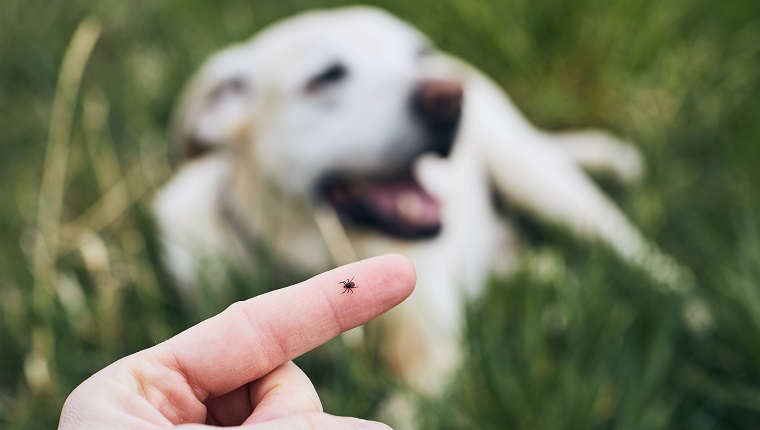Ehrlichiosis in dogs is a tick-borne illness that can lead to lifelong health issues like anemia, eye problems, neurological problems, and hemorrhaging.
When an infected tick bites a dog, the tick transmits the harmful rickettsiae Ehrlichia canis, or E. canis, an organism similar to but not quite the same as bacteria, which can cause a host of problems for your pup.
The organism attacks monocytes, a type of white blood cell important for your dog’s immune system. E. canis is most often found in brown dog ticks, which are most common in the Southeast United States and near the Gulf of Mexico.
Diagnosing Ehrlichiosis in dogs can be difficult because the disease has three stages: acute (early disease), sub-clinical (asymptomatic), and clinical or chronic (long-standing infection), all of which have different symptoms.
Some dogs might fight off the infection and recover after the first stage, but others may have lifelong, chronic health ailments.
If you see the signs of Ehrlichiosis in your dog, then you must consult your veterinarian right away so they can treat it. Here’s what you should know about the symptoms, causes, and treatments for Ehrlichiosis in dogs.
Symptoms Of Ehrlichiosis In Dogs
Dogs show different symptoms of Ehrlichiosis depending on what stage of the disease they’re in. Often, dog parents will notice their dog is not well in the early disease stage, known as the acute stage.
During the acute stage, an infected dog may display a range of symptoms including:
- Fever
- Swollen lymph nodes
- Spontaneous hemorrhaging or bleeding
- Neurological issues, like losing their balance or seeming “off”
This stage typically lasts three weeks before moving into the next stage of the illness, sub-clinical, when your dog may not show any symptoms at all.
Some dogs are able to fight off the infection and may not move into the third, chronic stage, or a long-standing infection. German Shepherds and Greyhounds are especially prone to developing long-standing infection, but any dog can develop it.
Symptoms of this final stage will last for a dog’s entire life and might include (but is not limited to):
- Hepatomegaly (enlarged liver)
- Arrhythmia and other heart issues
- Polyuria (excessive urination)
- Bruising
- Stiff, swollen, painful joints
Neurological abnormalities like cranial nerve deficits and seizures also may affect dogs in the chronic stage of Ehrlichiosis.
Causes Of Ehrlichiosis In Dogs

Ehrlichiosis in dogs is caused by ticks, commonly brown dog ticks, that carry the Rickettsia bacteria Ehrlichia canis, or E. canis. If a tick infected with E. canis bites a dog, then the dog may develop the disease.
Dogs in the Southeastern United States and certain parts of Asia have a higher risk of catching Ehrlichiosis because those places are where the brown dog tick is most commonly found.
Dogs who aren’t up-to-date with their flea and tick medications are also more likely to get bitten. That could increase their chances of contracting the disease.
Treatments For Ehrlichiosis In Dogs
Most dog parents will notice symptoms of Ehrlichiosis in the disease’s first acute stage, which lasts three weeks. During this time, your vet may recommended a course of Doxycycline, an antibiotic, to knock out the E. canis.
If your dog suffers from other symptoms due to the disease, your vet will determine the best course of action.
The best treatment for Ehrlichiosis in dogs, however, is prevention. Check your dog for ticks regularly and be sure to properly remove them.
Researchers believe that a tick might have to feed for 24 to 48 hours in order to transmit the bacteria. So the sooner you remove the tick, the better.
Also, keep administering your dog’s flea and tick prevention medication as prescribed by your vet.
Has your dog ever had a tick-borne illness like Ehrlichiosis? How do you keep your dog safe from ticks? Let us know in the comments!








